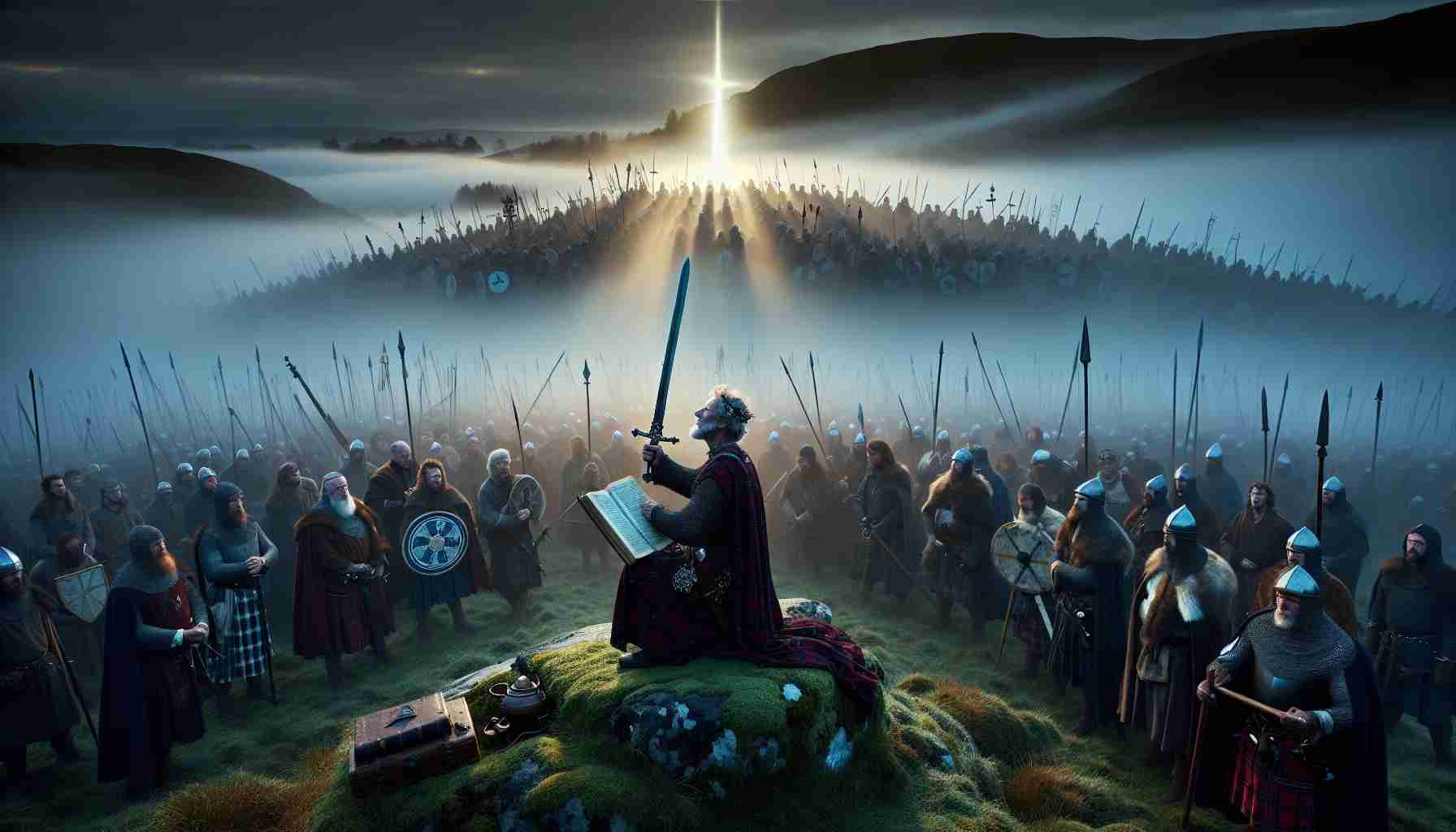

The morning sun broke across the Stirling hills like a sword drawn from its scabbard, glinting off mail and blade. Fog clung low to the earth, muting the clatter of impatient hooves and whispered prayers. Thousands of men stood shoulder to shoulder, Scots and English alike, their breath like mist, their cause as hard as stone.
On the southern slope, before the boggy plain of Bannockburn, Robert the Bruce knelt in prayer beside a moss-streaked stone. His armor bore the scars of a hundred skirmishes, but today, it gleamed as though polished by angels. A thin psalter, its pages worn soft by his fingers, lay open to Psalm 18:39: “You armed me with strength for battle; you humbled my adversaries before me.” He read the words with closed eyes, not aloud, but as though invoking a covenant.
Behind him stood bishops, clerics in battle robes, and knights whose hearts burned for more than steel and soil. The church had declared Bruce’s cause holy—not merely for crown or coin, but for the soul of Scotland. They believed the nation’s Christian heart throbbed in peril, pressed beneath English dominion. If Scotland fell, its church would bow to Canterbury, its praises twisted by foreign tongue and scepter.
A hush passed down the Scottish line like wind before a storm. Across the field, banners of St. George fluttered above the English host. Ten thousand strong, King Edward II’s army glittered with wealth and wrath. They did not fear the rebels on the hill. They had come to crush them, to scatter their so-called king into exile, and to claim this northern soil for the English crown once and for all.
But they had not reckoned with the terrain. Mud oozed between their horses’ hooves. Hidden ditches and wooden pikes bristled beneath the grasses, laid in secret by Bruce’s men for weeks. A battlefield chosen not by fate, but by strategy—and faith.
The trumpet sounded.
The ground shook as English cavalry surged forward, but their charge faltered. Spears rose like a forest from the Scots’ tight schiltron formations. Horses screamed, collapsing in chaos. Men clawed at the earth, their armor strangling them as muck swallowed heel and knee.
Bruce moved among his men, sword raised high, not above them, but with them. His battle cry echoed Psalm and conviction: “For God, and for Scotland!” It was not only his voice that lifted heavenward. In that fiery hour, every peasant with a pike, every noble’s son with an axe fought not merely for land, but for faith.
By nightfall, the English were broken—many drowned in the burn, others trampled in their retreat. Edward fled with his crown and shame. The field was thick with the fallen, but among the highland cries came psalms in Gaelic and Latin, sung from kneeling warriors beside the dead.
Word spread like fire through the land. Bishop Lamberton in St. Andrews wept openly, declaring the victory a mercy of divine grace. Monks lit candles in abbeys from Melrose to Iona. Churches rang their bells not for mourning, but for deliverance. Scotland’s soul had been spared.
In the months that followed, Bruce strengthened the Scottish church, banishing English clergy installed by force, erecting sanctuaries, and pledging gold to monasteries that sheltered the weary. He wrote to the Pope, asserting Scotland was a realm sovereign not just in law, but in faith.
Yet not all was peace. Rumors stirred that Bruce had taken relics into battle—a vial of St. Columba’s ashes, or perhaps a sword once laid upon the Stone of Destiny. None could confirm it, and Bruce never spoke of it. But those who fought at Bannockburn swore they had seen divine light pierce the English ranks at the hour of greatest peril.
Generations later, pilgrims walked the field, kneeling where Bruce had prayed. A chapel rose atop the hill, now gone to ruins, its stone walls weathered but its memory immortal.
And still the psalm endured: “You armed me with strength for battle...”
It was more than a verse. It was the breath of a people who believed salvation could march on muddy feet, that God could strike through sword and shield when the cause was just. At Bannockburn, courage was born not only of steel—but of sacred promise. Faith had not merely survived the clash.
It had carried the banner.